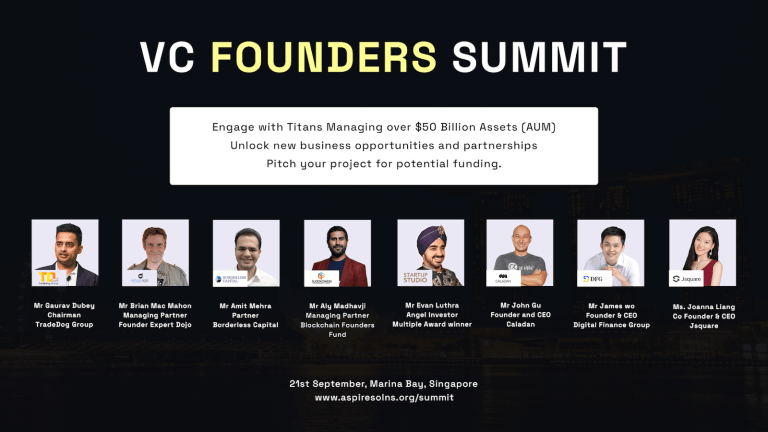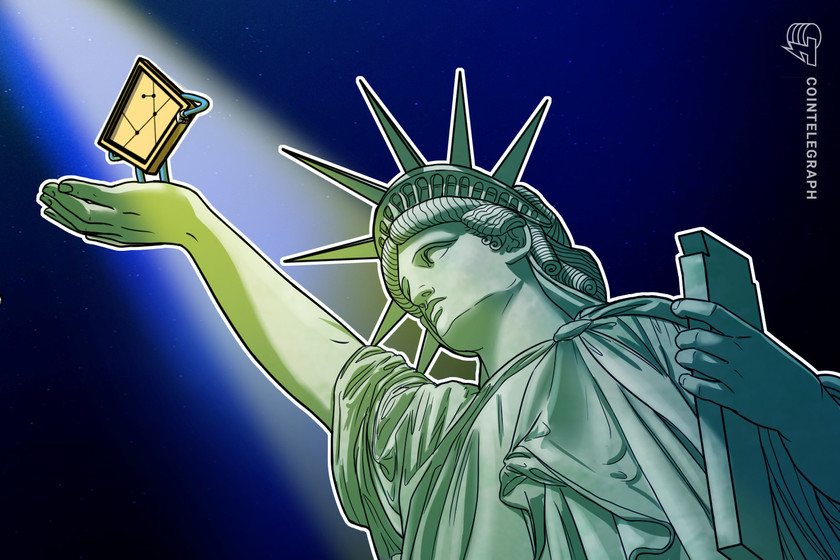 PRESS RELEASE. [Singapore, 2024] – The much-anticipated VC Founders Summit is set to take place on September 21st, bringing together venture capitalists, industry leaders, and innovators to shape the future of investment and entrepreneurship. As a dynamic side event of the renowned Token2049 conference, and coinciding with the excitement of Singapore Formula One Week, this […]
PRESS RELEASE. [Singapore, 2024] – The much-anticipated VC Founders Summit is set to take place on September 21st, bringing together venture capitalists, industry leaders, and innovators to shape the future of investment and entrepreneurship. As a dynamic side event of the renowned Token2049 conference, and coinciding with the excitement of Singapore Formula One Week, this […]The muted energy at EthCC(7) highlights the crypto industry's struggle for direction and consumer adoption despite significant growth.
The post EthCC(7) – The quest for adoption continues appeared first on Crypto Briefing.
 Condense, a Bristol, England-based metaverse company that produces technology to allow the streaming of events to virtual reality apps, has raised $4.5 million in its most recent seed round. The round, which was led by Localglobe, 7percent Ventures, and Deeptech Labs, gives Condense funding to deepen its relationship with artists, labels, content creators, and metaverse […]
Condense, a Bristol, England-based metaverse company that produces technology to allow the streaming of events to virtual reality apps, has raised $4.5 million in its most recent seed round. The round, which was led by Localglobe, 7percent Ventures, and Deeptech Labs, gives Condense funding to deepen its relationship with artists, labels, content creators, and metaverse […]
"We have theaters, disco clubs, event halls. In 2022, we have a goal to onboard 1,000 new venues around the world using seating ticket sales," says CEO and founder Stoyan Angelov.
Evedo, a platform consisting of business-to-business, or B2B, & business to consumer, or B2C, marketplaces, seeks to provide blockchain solutions for businesses and participants involved in organizing events.
In an exclusive ask-me-anything, or AMA, session with Cointelegraph Markets Pro, Stoyan Angelov, founder & CEO of Evedo & Fragmint, discussed the business dynamics and tokenomics of Evedo.
Evedo tokenomics | Source: Evedo Technical Deck
CT Markets Pro User: How does Evedo use blockchain technology for the events sector? Will the ecosystem be available for everyone or just artists and big events organizers?
Stoyan Angelov: The EVED token is a utility token used to generate smart contracts between ticket buyers and sellers. Even now, we have 1,000+ clients that are working with our platforms to execute events, and we are event agnostic (small, medium, large of any type). So any event organizers are welcome to use the system. This is how the user profile looks like. We already have 5000+ users there, and in the following weeks, we will update and launch the updated marketplace.
CT Markets Pro User: How can event planners rely on tokens, considering they have fixed costs to settle?
Stoyan Angelov: At the beginning, we will be implementing stablecoins, and the EVED token will be used for premium features such as targeted advertising, community management and access to different tools on the platform. Consequently, the event organizers or other service providers will have the option to choose if they want to accept partial or full payment in EVED.
CT Markets Pro User: What is Eve's business model, considering there is no ticketing sales fee?
Stoyan Angelov: Evedo's business model is based on the additional value in the ecosystem. Keep in mind that we also have a commission from the ticket sales. A0% commission will be if the organizers use the EVED token for sales. FIAT is available now, and with FIAT, we charge a 5% commission.
CT Markets Pro User: How will Evedo deal with high Ethereum (ETH) gas fee issues?
Stoyan Angelov: We still didn't implement the EVED payments in the ticketing because of the insane gas fees. Unfortunately, this is a show-stopper adoption on the ticket sales. Our exit plan is to become multi-chain and onboard the first HYDRA blockchain. In that way, we will finally have a chance for the EVED to be implemented.

The nonfungible token cyberspace, however, is in need of significant media broadcasts and promotion from notable consumer brands to take off.
For the past three years, NYC.NFT has been the leading annual gathering in the nonfungible token and digital blockchain art world. This year, over 5,500 attendees and 135 sponsors joined debates, talks, workshops and briefings in the namesake event. In an exclusive ask-me-anything session, Cameron Bale, co-founder of NYC.NFT, joined Cointelegraph Markets Pro users to discuss the outlook on the NFT industry. Here's what Bale had to say.
Cointelegraph Markets Pro User: You had some amazing speakers in NFT.NYC 2021. Can you tell us a bit aboutwhat insights were shared by some of those heavily influential folks?
Cameron Bale: Some people don't realize it, but 2021 was our 3rd year hosting the event. Hardly anyone knows!! We had 500 attendees in the first year (I think beyond those people, most believe NFTs have only been around a year or so!) Personally, since our first year, I think we knew that many industries, beyond gaming and art, would be disrupted by NFTs. The coolest thing was seeing real-world applications of NFTs within some of those industries.
CT Markets Pro User: Justin Herzig presented a "formula" to value NFTs. Is there such a thing? How can NFT.NYC help projects build a community?
CB: I think that is an excellent idea so long as people don't treat it as gospel. Certain signals can suggest or help predict the increasing value of a project, such as news stories, the buzz on social, growing community on Discord. People relying on this information and investing money they can't afford to lose high risk — indicators like Justin presented need to come with a disclaimer, as I'm sure he does!
CT Markets Pro User: Other than art, what are the most critical use cases for NFT?
CB: There are some pretty cool use cases out there. Anyone who joined the space early might recognize these cycles of NFTs penetrating different industries. Art and collectibles came first. In my opinion, this was because they are digestible and relatively easy to understand use cases. Following that, blockchain gaming, and then onto more focused industries, ticketing, entertainment, genetics, all sorts of cool stuff. Finally, in 2021 we saw mainstream adoption for art kicking off. Thank you, Beeple, Metakovan, and Christie's, for bringing it to the mainstream!
Now we are seeing events that shine a light on those other industries. Gaming and metaverses are starting, etc. The question above about Zuckerberg and Meta is interesting. Anyone who holds land in the Sandbox or other metaverse projects probably noticed a spike in interest in their assets following Facebook's announcements.
The NFT community is curious and optimistic about how NFTs can disrupt these different industries. Still, without adoption by mainstream media and brands who can reach millions/billions and show them HOW, we won't see the impact we want.
Related: The NFT world is gradually bridging the gap between niche and mainstream
CT Markets Pro User: What are the top NFT projects you will watch for 2022?
CB: Three things guide my personal interests. (1) Does it have a meaningful utility that adds value to my life, or someone else's — I am excited about virtual land now that the world is waking up to metaverses! (2) Is there a community — this could be literal in the sense of Discord groups or online communities, or it could be aspirational, like getting an NFT from a brand you admire and becoming part of "the tribe" (3) Do I love the art?
CT Markets Pro User: How will NFT be used with consumer goods? Serialized products?
CB: That's a really broad one! Digital twins/NFT registration of high-value or luxury goods is a cool use case. We ran a trial at NFT.NYC, where we gave away 1,000 caps — each contained an NFC tag which could be scanned by tapping your phone on it.
The first time it was tapped delivered you an NFT that essentially registered the product. Subsequent taps after that then showed whoever scanned the tag who owned the product (via the NFT). I think that's an excellent example because you can verify the authenticity of the physical product by confirming that the official brand minted the attached NFT. Another one for consumer products is coupons. Of course, digital coupons have been around forever, but using NFTs as the store of value of coupons makes them tradable and composable.
Related: Daft Punk meets CryptoPunks as Novo faces up to NFTs
CT Markets Pro User: Will NFT.NYC 2022 tickets be minted as NFTs?
CB: This was a common question at NFT.NYC 2021. We have experimented with NFT ticketing every year of the event. There are some great crypto-centric products out there (we had a great experience with Mintbase in 2020). However, in my experience, I've yet to find a platform that caters to the business needs of a large-scale event (think communications with attendees and badge printing, etc., or to mainstream audiences). We are focused on bringing mainstream media and newbies into the space.)